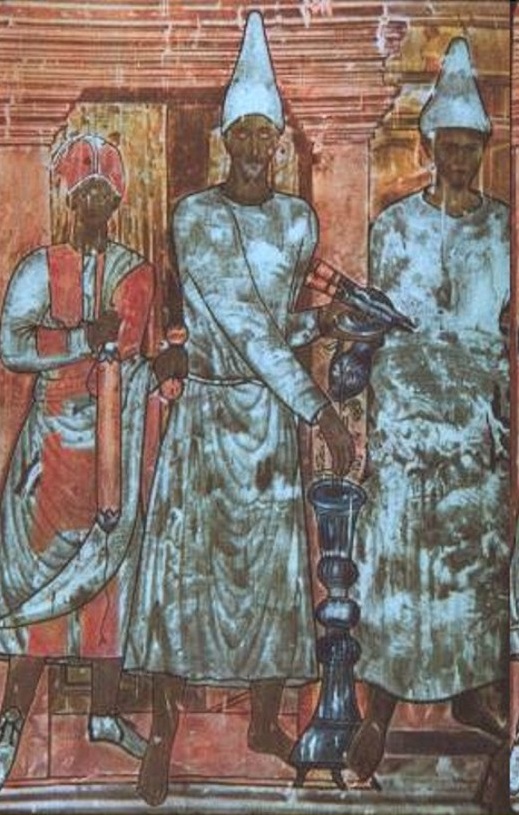
by Douglas Loss

by Douglas Loss
Sacrifices are an essential part of most religious traditions.
These offerings to the gods serve to indicate reverence and a willingness
to serve in any way needed.
As such, normal sacrifices must be made regularly,
as gestures of thanks for victory in battle,
good fortune in finding treasure,
or any generally good occurrence.
Over and above the standard type of sacrifice is the sort used when
a cleric wishes to call on his or her deity
for a ďmiracle.Ē
A miracle is a spell higher in level than the normal limit of the cleric
in question.
If a god has been favorably impressed by the piety of his servant,
he will grant ó on a one-time-only basis ó the ability to cast a spell
ďmiraculously.Ē
This miracle spell will generally be sufficient to accomplish the requested
or desired purpose, because the success of a miracle reflects directly
on the competence of the god.
If a godís miracles arenít enough to do his will, he isnít much of
a god. Of course, this doesnít mean the cleric will necessarily USE the
spell to his or her, best advantage.
What constitutes a decent sacrifice?
There are three types:
* inanimate,
* animal, and
* sentient.
Inanimate: Inanimate sacrifices are either
objects of intrinsic value such as gold,
gems,
fine wines or oils,
or rare spices or scents; or objects of symbolic value such as an
idol or image of the god, or something related to the mythology
of the god. The symbolic objects must be consecrated before-
hand. A good example of this is druidís
mistletoe. Itís symbolic
of the permanence of life and natural things, regardless of the
appearances. It is consecrated by the ritual collection method
(gold, sickle, catching in a bowl, etc.).
Intrinsically valuable objects increase the chances of the god
granting a miracle by 2% for each standard measure of material.
Each DM must determine these standard measures for his cam-
paign. They might be 100 gp in coin, an
equivalent-value gem, a
cask of wine, 5 drams of perfume, etc.
Symbolically valuable objects are specific
to each campaign,
and their increases to the probability of being granted a miracle
should be determined individually by each DM.
In no case should the increase be more than 5% for each symbolically
valuable object in the sacrifice.
Animal: Animal sacrifices are those animals
not considered either
sacred || unclean by the god. In general, each animal sacrifice
increases the chance of a miracle by 2%; if the animal used is
especially favored by the god as a sacrifice, it adds 3%. Such
animals must be ritually dedicated to the god immediately be-
fore being killed. Just shouting, ďFOR (GODíS NAME)!Ē and slicing
wonít do.
Sentient: Sentient sacrifices are thinking
creatures, of an alignment greatly divergent
from the clericís.
They increase the chances of a miracle by 5% each.
An attempt must be made to convert any sentient sacrifice to the clericís
god.
Only upon the failure of the attempt to convert will the sentient count
as a sacrifice.
Those of lawful or good alignment must diligently work at this conversion
attempt.
Others neednít be quite so zealous. As with all sacrifices, sentients
must be sacrificed according to strict ritual.
Increasing the amounts of a sacrifice raises the chance of being granted
a miracle.
However, in no case will the chance of a miracle be greater than somewhere
around 50%, no matter how many sacrifices are made.
Of course, thereís no reason a DM must tell the player that.
Once a cleric has sacrificed as much as he or she feels necessary, d%
are rolled to see if the miracle is granted.
Whatever the outcome, the sacrifices no longer can be counted toward
the next attempt.
If a cleric attempts to gain miracles too often (more than
perhaps once a year or so), the max. psb. probability
will go down 5% with each successive attempt (i.e., the next
attempt will be no more than 45%). If the probability gets down
to 20%, a check must be made (if the miracle isnít granted) for
the godís wrath. The chance of godís wrath starts at 50% and
increases by 5% for each subsequent miracle attempt, success-
ful or not. Eventually, the godís going to get mad.
Obviously, miracles must be carefully prepared for and closely moderated.
They will never happen on the spur of the mo-
ment. That sort of activity is called DIVINE
INTERVENTION ó and
that might happen once in a long campaign.

And there you are. Oh, you donít think this sort of thing would <happen>
in your campaign? Youíre sure? (Light
the votive candles,
boys, start chanting quietly, and hand me the ceremonial
dagger...)
Youíre sure?